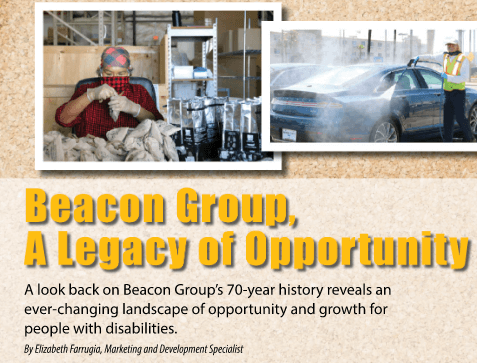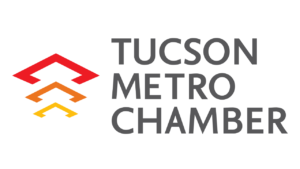SIGN IN

A Legacy of Opportunity: Beacon Group’s 70-year history reveals an ever-changing landscape of opportunity and growth for people with disabilities
A Legacy of Opportunity
Beacon Group’s 70-year history reveals an ever-changing landscape of opportunity and growth for people with disabilities
By Elizabeth Farrugia | Marketing and Development Specialist at Beacon Group
In 1952, Homecrafters, later to become Tetra Corporation, was founded with the mission of teaching people with disabilities the skills to improve their lives and succeed in employment opportunities. Three years later, Beacon Foundation was established by eight mothers who recognized that if simply given guidance and training, their children with disabilities could take a purposeful place in the community. These two organizations concurrently put into motion a driving force that would better the lives of people with disabilities in the Tucson community.
An outpouring of support
Over the first few years, each organization grew quickly and so did the community’s understanding and support of people with disabilities. Local employers began hiring people with disabilities through Homecrafters while businesses, organizations, and individuals volunteered and partnered in fundraising events.
Word of the movement was spreading and these two organizations earned an outpouring of support from celebrities. In 1958, Dean Martin and John Wayne hosted a live telethon to benefit Beacon Foundation. Tucson businesswoman and fashion pioneer, Cele Peterson, showed her support by donating a poncho design to Homecrafters which they produced to be sold in her popular clothing store, Cele Peterson Shop. In 1959 and 1960, Bing Crosby, Desi Arnaz, Phil Harris, Randolph Scott, and James Garner flew into Tucson to golf and raise funds for Beacon Foundation in the Celebrity Benefit Golf Exhibition.
Community engagement
“Beacon Group supports a rich history of community connections and business partnerships,” says Mitch Eskritt, Director of Marketing and Development. “It is because of these relationships that Beacon Group has been so successful in creating opportunities for people with disabilities in Arizona.”
By 1964, Tetra Corporation had served 264 people with disabilities, including placing 65 into jobs. Beacon Foundation’s preschool had more than 40 children and was generating new ways for those in the foundation’s adult program to gain job skills. To grow the adult program, Beacon Foundation opened Value Village Thrift Store in 1965. The store quickly became popular and offered an environment where people with disabilities could learn valuable work skills. It was abundantly clear that both organizations were succeeding in their missions.
As the 1970’s ended and more services for children with disabilities were offered at public schools, Beacon Foundation shifted its focus to services for adults. The economy had weakened and both Beacon and Tetra were looking for more innovative ways to offer services. Recognizing the strong value of having people with disabilities working in the community, both organizations focused on creating worksites at local businesses. Some of the first sites were at Jim Click Ford, Holmes Tuttle Ford, IBM, and Southwest Gas—many of whom continue to be Beacon Group’s greatest partners, supporters, and employers to this day.
Measured growth
The next two decades saw growth for both Tetra and Beacon. In 2003, recognizing that they served the same population and pursued the same subcontract work, the organizations combined forces to create even more opportunities for people with disabilities. Tetra Corporation and Beacon Foundation officially merged to become Beacon Group.
Over the next few years, the organization doubled in size, and it became clear a larger facility was needed. In 2009, the Steve and Kathy King Community Center that you see today at 308 W. Glenn was complete after growing to more than 64,000 sq. ft. with room for an even greater variety of employment services and job skills training opportunities.
Meaningful lives
Since that time, Beacon Group has expanded to provide services to more than 1,800 individuals while placing 329 into competitive employment last year. Despite Beacon’s success, only 35% of working-aged people with disabilities are currently employed.
Beacon’s President and CEO Greg Natvig says, “There are thousands of people with disabilities who are ready, with Beacon Group’s help, to become outstanding workers in Tucson organizations.”
As we look to the future of Beacon Group, we have benefited by the great strides made by trailblazers in the disability community over the past 70 years. Since 1952, we have seen changing economic conditions, emerging new fields, and evolving opportunities for employment. Through each change, we have generated more innovative services to continue the growth of the organization and the people served. The legacy we wish to leave is one that has carried Beacon Group from its founding days to today and will carry it forward for the next 70 years—the unwavering belief that people with disabilities should have every opportunity to live meaningful and fulfilling lives through work.
